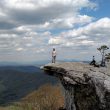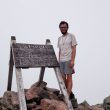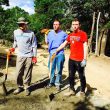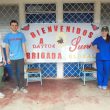It was a cold, rainy day in the spring of 2015, and John Porter ’20 was having one of those, “What am I doing out here?” kind of moments.
“I’d caught some kind of stomach bug,” recalls the Ohio native and first-year Geisel student, who was traversing a rocky section of hiking trail in Pennsylvania. “I remember just feeling terrible, having to stop and throw up on the side of the trail, and really missing home at that point. Afterward, I sat down and thought, ‘Do I really want to do this?’”
This was no ordinary hiking trip. Porter was still in the early stages of his goal to “thru-hike” the Appalachian Trail (AT)—a 2,200-mile trek that passes through 14 states between Springer Mountain in Georgia and Mt. Katahdin in Maine.
But when he finally got to a shelter that evening, he started to feel better. “There were people sitting around, playing cards, and everyone was in a good mood,” recalls Porter. “It’s hard to stay upset when everyone’s having fun like that, so it kind of re-centered me.
“The sense of community you feel and the good friends that you make on the trail, together with the ‘trail angels’, the people who live near the trail that do things to help out hikers—whether it’s setting up a grill and feeding people hotdogs on the way or giving them rides into the nearby ‘trail towns’—ended up making it one of the coolest experiences of my life,” he says.
Porter’s plan was to do what AT hikers call a “flip-flop.” Starting in West Virginia, he worked his way north, reaching Katahdin in mid-summer. He intended to return to West Virginia and finish the hike south to Georgia by early fall, but had to fly home instead.
“I’d been sending in my medical school applications from ‘trail towns’ where I could access a computer, and had asked if some schools could interview me later in the season after my hike, but several didn’t honor my request,” explains Porter. He would return to hike the lower half of the trail in the spring of 2016, completing the AT in a combined 4 ½ months and within a calendar year.
Raised in southwest Ohio (Dayton), Porter loved sports, excelling at soccer from an early age. His interest in medicine began more casually, through family connections. “I have two aunts who are doctors—one at the Cleveland Clinic and one at Bellevue Hospital in New York City,” he says. “Growing up, I’d always looked up to them but only had a vague understanding of what they did.”
He got more intrigued after they invited him to shadow them for a weekend each while he was in high school. “Going into college, I was leaning towards medicine, but it wasn’t until the spring of my sophomore year at the University of Dayton that I knew for sure,” says Porter.
That’s when he got involved with Global Brigades—an international student-led organization that works to improve the health and economic development of rural communities in Central America and West Africa. While at U Dayton, Porter led trips to Honduras and Nicaragua (twice) to help set up medical clinics and make public health improvements (like installing new sanitation units) for people living in remote villages.
At the medical clinics, students served a variety of roles—from shadowing the doctors, to checking in patients, to working in the pharmacy. “Seeing how the doctors interacted with patients and the impact they had, and how grateful people were to receive care left a big impression on me,” Porter recalls. “And even though our time with the communities was limited, it was nice to know we were part of a bigger movement to help them become self-sustaining.”
The experiences encouraged him to seek other opportunities. Porter served as an administrative office volunteer at a local free clinic, and spent a summer researching sexually transmitted infections (STIs)—for a physician he’d met in Honduras—at Dayton’s public health department, a project that helped streamline care for patients with STIs.
Porter graduated from college in 2015 with a bachelor’s in psychology/pre-med and a minor in medical humanities. During his gap year, he volunteered at Hospice of Dayton as an ambassador and worked as a substitute teacher at local middle and high schools to earn money, in addition to hiking the AT and going through the medical school application and interviewing process.
Prior to his trek, he had never been in New England and was struck by the rugged beauty of the region. “Going through the White Mountains, which feature the longest stretch above tree line on the whole trail, was one of my favorite parts of the trip,” says Porter.
Another was hiking through the trail towns of Hanover and nearby Norwich, VT. “Both towns have extensive trail angel networks of people who are willing to actually host hikers in their homes, which is incredibly generous of them,” he explains. “When I came through the area, I stayed in Norwich with Betsy Maislen, an advanced practice registered nurse at Dartmouth-Hitchcock, who is a really cool person.
“A few years ago, her son thru-hiked the AT and got a blister in Tennessee that became badly infected,” says Porter. “A trail angel family ‘adopted’ he and his buddy for a week or so, so he could heal up and continue with the hike. Betsy was so touched by their kindness she now hosts and feeds hikers free of charge. Her only request is that they pay the kindness forward once more and perpetuate the chain.”
When Porter returned to Hanover for his interview at Geisel, it was a bit like coming home. With its access to many outdoor activities, and its collaborative learning environment, which emphasizes a healthy work-life balance, Dartmouth was definitely high on his list.
“Once I felt the strong sense of community here, from the students, the professors, and people like Betsy, I knew this was where I wanted to spend the next four years,” says Porter. “It’s a great place to be a medical student.”




